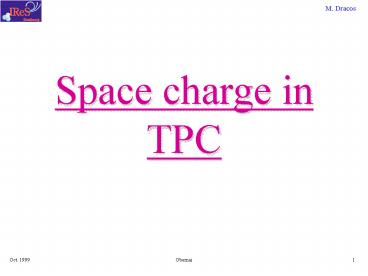Space charge in TPC - PowerPoint PPT Presentation
1 / 23
Title: Space charge in TPC
1
Space charge in TPC
2
Positive ions drift time
- Reference gas 90Ar10CH4
- Ion mobility m 1.64 10-6 cm2/V/ms
- Drift field Ed0.5 kV/cm
- Ions drift velocity vion0.82 10-3 cm/ms
- Electrons drift velocity ve-5 cm/ms
(ve-/vion6100) - Max. drift time for electrons 50 ms
- Max. drift time for ions 305 ms
2820 BX
200 ms
930 ms
All ions will not be evacuated between two trains
3
Ions inside the TPC
Two types of ions
- Ions created directly inside the TPC volume by
primary ionisation - Ions created during the avalanches inside the
chambers
chamber
ions
4
Estimation of the positive ions number
Ties Behnke (Sitges)
Try to have an estimation using these numbers...
5
- 1 hit 1 electronic channel
- 118 pad raws for DR138 cm Þ 1.17 cm/raw
- minimum ionising particles 100 e-/cm Þ we
assume that we collect 117 e-/hit (not so valid
for protons coming from neutrons)
Ne-prim117x716280 e-8.4x107 primary e- (or
ions) 14 pC (or nC?)
- If gain104 Þ 8.4x1011 ions produced inside the
chambers - If only 1 of these ions get inside the drift
volume
Nionssec8.4x1011x0.018.4x109 1.4 nC (or
mC?) (Nionssec100 Ne-prim)
6
Micro Gap Wire Chamber
7
Positive ions motion (MGWC)
Fraction of ions going inside the drift volume
8
Other Detectors
9
Effect of the space charge
Drift velocity in the presence of a magnetic
field
Azimuthal component
If
Lorentz angle
10
Development of the positive ions inside the TPC
ions
primary ions
170cm
electrons
beginning of next train
end of the first train
beginning of the first train
end of the next train
secondary ions
0.82 cm
chamber
11
Electrostatic simulation of the TPC
12
Electric field configuration with uniform ion
distribution
13
Electric field configuration with non-uniform ion
distribution
Qprim10 mC Qsec100Qprim
14
Electric field configuration with non-uniform ion
distribution
Qprim1 nC Qsec100Qprim
15
Lorentz angle with B4T
x40 cm
x165 cm
Primary ions charge
16
Lorentz angle with B4T
Inside the ions band at z0.82 cm, x40 cm
Inside the ions band at z0.82 cm, x165 cm
Primary ions charge
17
Lorentz angle with B4T
Inside the ions band at z170 cm, x40 cm
Inside the ions band at z170 cm, x165 cm
Primary ions charge
18
Focalisation with B4T
19
Gating to remove the secondary ions
Grid at z1.5 cm
end of the train
primary ions
secondary ions
0.82 cm
Secondary ions are collected 1.7 ms after the
last train
20
Gating
B0 T
B4 T
21
Gating
B4 T
22
Lorentz angle without secondary ions (B4T)
Primary ions charge
23
Conclusion
- Space charge could produce non negligible
effects, - Number of positive ions to be well evaluated
(especially coming from neutrons), - Gating needed to remove secondary ions,
- Inner tracker could help to remove residual
effects inside the TPC.































